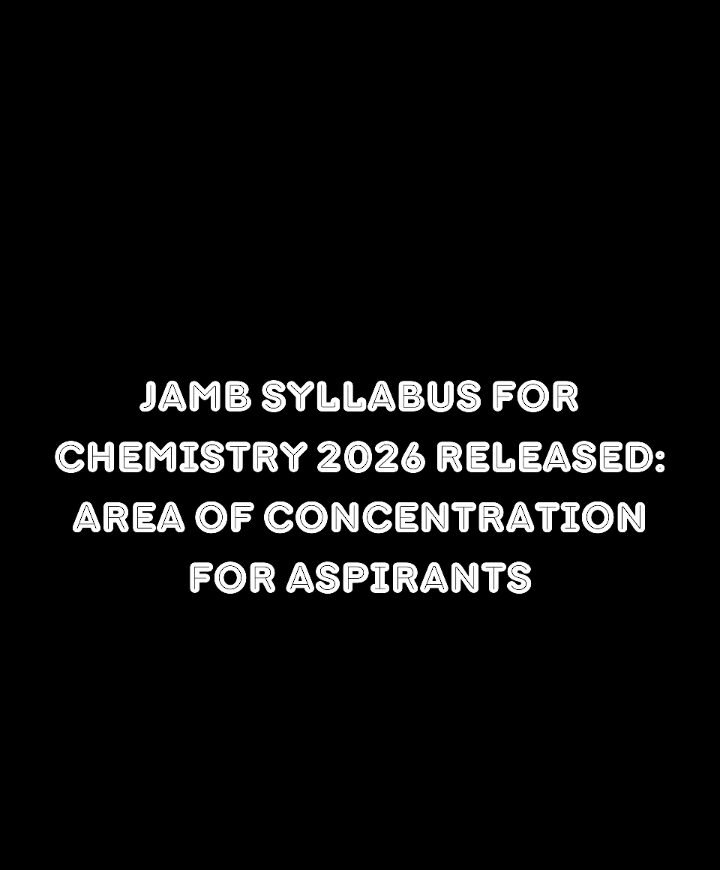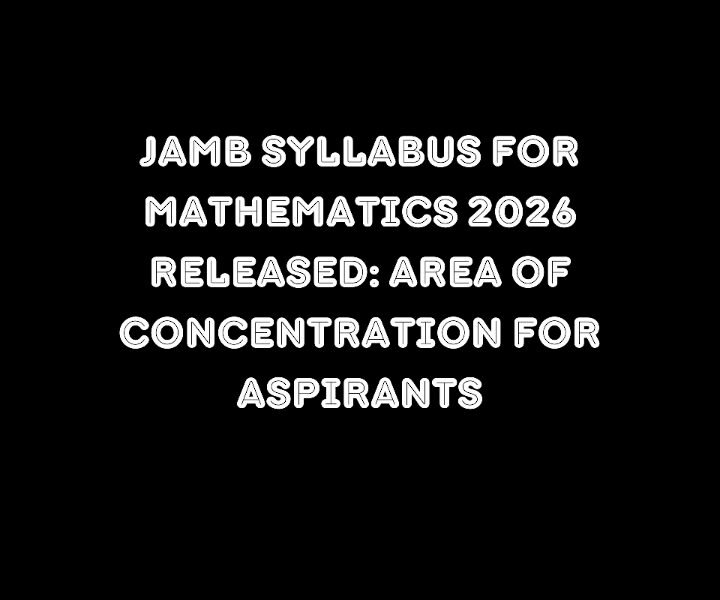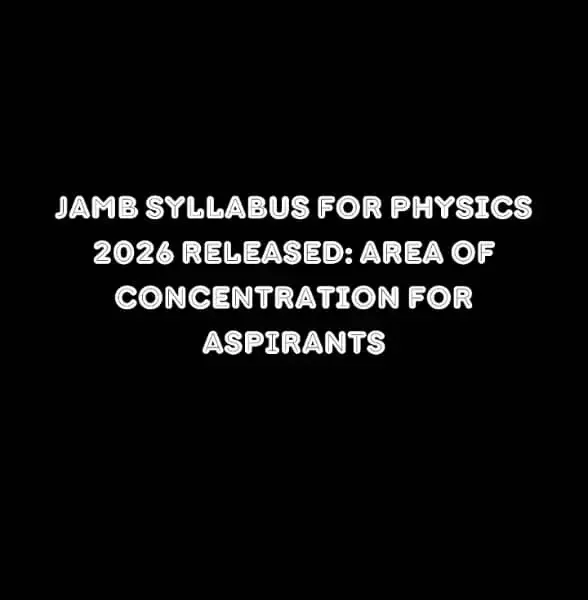The Chemistry 2026 JAMB Syllabus is now available. It is something you cannot afford to ignore as long as you are about to write the 2026 UTME.
This blog post will take you step by step on the analysis of the syllabus, areas of focus as well as how to study smart rather than hard.
Let us look at a deep scan of the things that matter the most in JAMB Chemistry 2026.
JAMB syllabus for chemistry 2026: Full Breakdown
Below is a subject-by-subject outline of what to look forward to studying under the JAMB Syllabus in Chemistry 2026.
These are straight out of the syllabus but given in easy to understand language to make you know what each one entails and how to prepare.
1. Separation Techniques and Chemical Combinations
You should know:
– Differences between elements, mixtures, and compounds
– How to separate mixtures using filtration, distillation, sublimation, chromatography, etc.
Why it is important: JAMB is a big believer in real-life illustrations. Consider the separation of salt and water or ink and paper.
2. Atomic Structure
You should know:
– Protons, neutrons, electrons
– Isotopes and electronic configuration
– Atomic number and mass number
Focus on: Bohr’s model, periodic trends, and how atomic structure affects reactivity.
3. Periodic Table
You should know:
– Periodic law
– Classification into groups and periods
– Trends in atomic radius, ionization energy, electronegativity
Tip: JAMB often asks about Group 1, Group 17 (Halogens), and Group 18 (Noble gases).
4. Chemical Bonding
You should know:
– Ionic, covalent, and metallic bonding
– Hydrogen bonding and Van der Waals forces
– Properties of substances based on bonding
Real-life link: Why salt dissolves in water but petrol doesn’t.
5. States of Matter and Gas Laws
You should know:
– Solid, liquid, gas
– Boyle’s law, Charles’ law, Ideal gas equation
– Kinetic theory of gases
Expect calculation questions here.
6. Energy Changes in Reactions
You should know:
– Exothermic vs. Endothermic
– Enthalpy changes
– Activation energy and energy diagrams
JAMB is now testing more application-based questions in this area.
7. Rates of Reaction
You should know:
– Factors affecting reaction rate: temperature, concentration, catalysts
– Collision theory
– Graphical interpretation of rate data
Tip: Learn how to draw and interpret reaction rate graphs.
8. Chemical Equilibrium
You should know:
– Dynamic equilibrium
– Le Chatelier’s Principle
– Effects of temperature, pressure, and concentration
This is a high-yield topic. JAMB often twists questions here.
9. Acids, Bases, and Salts
You should know:
– pH scale
– Strong vs. weak acids and bases
– Preparation of salts
Practice titration and neutralization reactions.
10. Solubility and Solubility Curves
You should know:
– Saturated, unsaturated, and supersaturated solutions
– Solubility curves and how to read them
Expect graphs and interpretation questions.
11. Electrolysis and Electrochemistry
You should know:
– Electrolytes vs. non-electrolytes
– Electrochemical cells
– Faraday’s laws
Real-life link: Electroplating and batteries.
12. Organic Chemistry
You should know:
– Hydrocarbons: alkanes, alkenes, alkynes
– Functional groups: alcohols, carboxylic acids, esters
– Isomerism
Tip: Pay attention to naming and simple reactions.
13. Environmental Chemistry
You should know:
– Water treatment
– Air pollution
– Effects of chemical waste
This section is becoming more relevant due to global climate discussions.
14. Industrial Chemistry
You should know:
– Processes like Haber, Contact, and Solvay
– Raw materials, conditions, and by-products
JAMB often asks fact-based questions here.
Smart Study Tips for the JAMB Syllabus for Chemistry 2026
Having witnessed the structure, here is how to go about it in a smart way:
1. Don’t Skip the Basics
Without a strong foundation, then nothing will hold. You will have to go back to SS1 notes.
2. You should start seeing the official Syllabus like a Checklist.
Do not forget to download the JAMB Syllabus of Chemistry 2026. After you download, then check off any of the topics that you have mastered.
3. Practice with Past Questions
You can not solve questions randomly. Check yourself question-by-question on categorized past questions.
4. Create Summary Sheets
Definitions, formulae, and significant examples should be written after every topic. Use colors if it helps.
5. Work with a Study Group
Trying to explain concepts to other people makes it easy to understand them.
The Mistakes You Must Avoid
– Memorizing rather than learning.
– Knowing reactions without understanding conditions
– Disregarding topics involving calculations.
– Reading theory without questions to practice.
– Failing to time yourself on practice.
Tools that can help you cover the JAMB Syllabus for Chemistry 2026
– JAMB Recommended Textbooks such as New School chemistry and Ababio.
– YouTube Channels that specialize in WAEC/ NECO Chemistry.
– Simulation apps on CBT practice: These are simulation programs of the actual examination.
Frequently Asked Questions
1. Is there a chance that JAMB could change the Chemistry syllabus before the exam in 2026?
Unlikely. JAMB board is not fond of changing the syllabus except on rare cases
2. Do science and engineering aspirants have the same syllabus?
Yes. As long as you’re a science student, you must use the syllabus.
3. Does the JAMB exam cover practical Chemistry topics?
Not directly. But there will be theory questions on practicals, such as procedures, observations, and inferences.
4. Should I not pay attention to Organic Chemistry if I’m not that good at it?
Do not ignore it because that will be a mistake on your end. One such most-tested area is Organic Chemistry. Focus on the basics.
5. What do I do to understand what topics are high-priority?
Consider the last 10 years of JAMB questions. Any topic that you observe keeps recurring should be taken seriously.
6. Is there a recommended duration that I should use to study chemistry daily?
At least 6 hours a week when writing science subjects. Divide it into theory, practice, and review.
7. Is the examination of diagrams and equations required?
Yes. You will be asked to write balanced equations and even interpret some molecular or structural diagrams.
Conclusion
When you use the JAMB Syllabus to Chemistry 2026 as a checklist, rather than a recommendation, you not only get it all you need but also have the confidence to go into the exam.
It is important to remember that Chemistry JAMB is not a matter of reading everything to succeed. It is about reading the correct things. You get that clarity with the help of the syllabus. Stick to it. Practice questions.
Review your mistakes. And do not wait till a few months to the exam.
If only you can commit to study now, chemistry will only end up as one of those subjects you will ace very well on that day.
Good luck!


